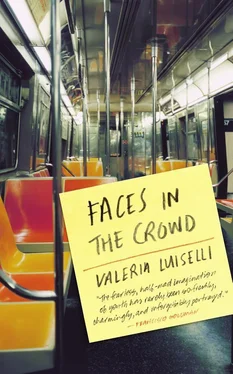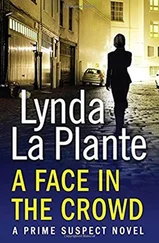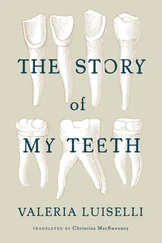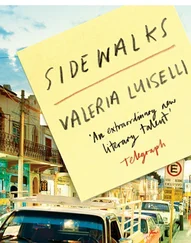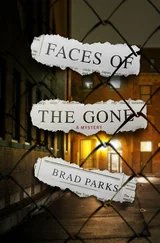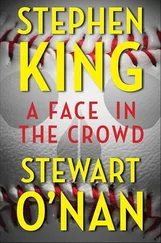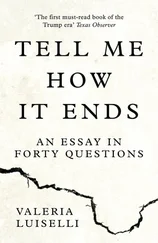*
The 1 line runs the length of Manhattan. It starts at the ferry terminal at the southern tip of the island, goes through part of Chelsea and up to Columbia University on 116th Street, where Owen used to take the train every day to the south of the city, after weighing himself on a machine by the ticket office. The line continues up to Harlem and I don’t know how much farther. The track goes on and on, beyond the island, beyond this story.
*
My husband announces at breakfast that he’ll be going to Philadelphia soon, and doesn’t know how long he’ll be away. Have you got a workery in Philadelphia? asks the boy. My husband ignores him and goes on talking. Papa, Papa, the boy insists, have you got a Philadelphia cheese workery, Papa?
Pa-pa, says the baby.
*
Philadelphia is falling down. And so is this apartment. Too many things, too many voices. There are three cats that appeared out of the blue one day. And a ghost, or several ghosts, also appeared. I can’t see the ghosts, nor can I make out the cats very clearly, but in my world of white shadows they’re one more obstacle to bump into every day — like the writing desk, the Reposet chair in which I used to read, the doors left ajar.
Of course, my blindness wasn’t instantaneous, and neither was the appearance of all these new tenants. But the day those things began to arrive — the blindness, the cats, the ghosts, the pieces of furniture, and dozens of books I hadn’t bought, and, of course, later on, the flies and the cockroaches — I knew it was the beginning of the end. Not mine, but the end of something I had identified with so closely that it would soon do away with me too.
If eyes can be compared with reflective pools of water, then the punishment of terminal blindness falls on them like a cataract. Blindness, like castigation and cataracts, comes from above, with no obvious purpose or meaning; and it’s accepted with the humble resignation of a body of water trapped in a pool, perpetually fed by more of itself. My blindness is black and white and I have a veritable Niagara on my brow.
*
Finally there came the day White had been waiting for so eagerly. For months, I had worked hard on the poems, and the book was scheduled to go to print in a couple of weeks. We were going to publish another selection of poems in advance of the book, this time in the New York Review of Books, and a renowned critic had asked to interview White and myself for a full profile of the poet Gilberto Owen, his years in New York, and his relationship to Zvorsky. We booked an appointment with him for the following week.
White invited me to raise a glass for Owen and cut down his tree. He’d finally made up his mind to do it. We’d use an electric saw, connected by an extension lead to a socket in his apartment. We had two pairs of thick, leather gloves. Wellingtons. A bottle of whisky. Aplomb.
But the saw didn’t work, so we ordered pizza and sat on the steps outside his building. White talked about his wife, how difficult the first years without her had been, the impossibility of throwing out her clothes, her books, her toiletries. White was an inconsolable man. He’d decided to set up the publishing house because the project had been her idea.
Why did you hire me, White? I asked after taking a long swig from the bottle.
Because, the day I interviewed you, I realized you smoked the same brand of tobacco as her. It was a way of smelling her every day. But, what the heck, let’s talk about Owen and Zvorsky. Maybe we can plan an anthology of Latin American poets translated by false William Carlos Williamses and Pounds.
I’d been stung, I realized a few hours or perhaps a few days later, to understand that White had never believed in me. Or Owen. If he’d hired me, it was because I smelled a bit like his wife. If we were going to publish Owen, it was because White wanted to publish Zvorsky, albeit apocryphally. I was just a whiff, a trail, a puff of smoke.
*
I suppose that’s what illness is like: you stand down and are replaced by the ghost of yourself. But at the same time, illness, and maybe particularly one like mine, which expresses itself in blindness, allows the sufferer to observe himself, as he would the picturesque, headlong descent of a cataract — from afar, without getting soaked, alarmed but not touched by the experience. Everything that had begun to happen to me since my arrival in Philadelphia — my constantly expanding body, my face disappearing before me in the mirror, the shadows of things replacing the things-in-themselves — started happening to that other person, the ghost of me, the poor idiot trapped under the constant rush of a cataract.
*
All novels lack something or someone. In this novel there’s no one. No one except a ghost that I used to see sometimes in the subway.
*
I used to check my weight every day in the subway station on 116th Street. It was always less, I was disappearing slowly inside my little unloved bureaucrat’s suit, but I wrote to a very pretty girl to say that I was filling out, that I was now a man, nearly, that she should give in and marry me. I lied: 125 pounds, 126 pounds. Beloved Clementina, sweet Dionisia, my letters began. At heart, even I didn’t believe anything I wrote, but I liked the idea of being a despairing poet in New York. I was leading an imbecilic life, but I liked it. I kept an almost metaphysical distance from things and people, but I liked it. I felt ghostly, and I liked that most of all. I didn’t know that I was one of those people with a talent for creating “self-fulfilling prophecies,” as the Yankees say. I didn’t know that, with time, I would really become a ghost. I was twenty-something, I allowed myself the luxury of writing about my thin body, of masturbating in the window, wrapped in a gray silk bathrobe, gray as my Harlem youth, dull as all youths in neighborhoods with literary names.
*
Not a fragmented novel. A horizontal novel, narrated vertically.
*
Three or four days after my conversation with White, I got an invitation from some institute or other that organized tributes to Mexican artists based in Brooklyn. From the outset, I knew the sort of nightmare I’d be getting into if I decided to go. It seemed to me, even then, and I believe rightly, that those events were just a modern-day version of Latin American civilized barbarity. The only difference being that now there was no contemporary Rubén Darío to write a redemptive column justly pillorying the participants.
I asked Pajarote to go with me. We’ll be rubbing shoulders with criollo trustafarians! he said — and for a moment I didn’t know if this was said with eagerness or sarcasm. Pajarote explained that “trustafarians” were wage earners, like us, except the wage came from their parents. In New York they lived a Bohemian life, but in Mexico they had uniformed maids. They snorted cocaine but were vegetarians, vegans, or even freegans. They dressed like teenagers — in T-shirts saying “Brooklyn” and “Mind the Gap”—but the guys didn’t have much hair and the women had premature crow’s feet.
We hired period costumes from some place in SoHo — to tell the truth, I don’t know if they were from the twenties or the fifties or a cobbled-together mix of the two — and drove to Brooklyn. We arrived arm in arm, seething with middle-class resentment. We were offered a shot of mescal and a bag of sherbet candies called Space Dust: Green or orange? asked a good-looker in hotpants, wearing a nametag that said “Fani” and a false mustache à la Frida Kahlo. We both chose green then mingled with our trustafarian compatriots.
I wanted to talk to Pajarote. He was the only person with moral intelligence I knew in the city, the only one who would tell me if I should go ahead with my publication plans. I wasn’t morally encumbered. I was afraid. And angry with White. More than anything, I’d lost any sense of purpose. But that night Pajarote had left his intelligence at home. He immediately Space Dusted Fani: he was wearing outsized fake glasses with heavy frames, and was feeling very self-confident. Although he in fact looked a bit like a Latino version of the young Zvorsky, he was convinced he resembled a London rock star — languid, indifferent. I went on drinking mescal, pretty much alone, diligently standing before all the pictures and installations in the venue (a loft). I was looking at a series representing a woman’s veined feet when I was cornered by a small bald man who could have been interesting if he’d tried a little less hard.
Читать дальше
